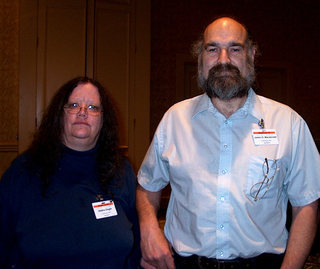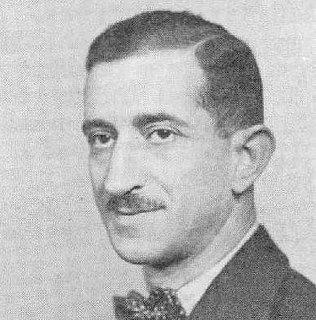
A library is a collection of materials, books or media that are easily accessible for use and not just for display purposes. It is responsible for housing updated information in order to meet the user's needs on a daily basis. A Library provides physical or digital access materials, and may be a physical location or a virtual space, or both. A library's collection can include printed materials and other physical resources in many formats such as DVDs, CDs and Cassette as well as access to information, music or other content held on bibliographic databases.
Sanford Berman is a librarian. He is known for radicalism, promoting alternative viewpoints in librarianship, and acting as a proactive information conduit to other librarians around the world. His vehicles of influence include public speaking, voluminous correspondence, and unsolicited "care packages" delivered via the U.S. Postal Service. Will Manley, columnist for the American Library Association (ALA) publication, American Libraries, has praised Berman: "He makes you proud to be a librarian."

The culture of Niger is marked by variation, evidence of the cultural crossroads which French colonialism formed into a unified state from the beginning of the 20th century. What is now Niger was created from four distinct cultural areas in the pre-colonial era: the Djerma dominated Niger River valley in the southwest; the northern periphery of Hausaland, made mostly of those states which had resisted the Sokoto Caliphate, and ranged along the long southern border with Nigeria; the Lake Chad basin and Kaouar in the far east, populated by Kanuri farmers and Toubou pastoralists who had once been part of the Kanem-Bornu Empire; and the Tuareg nomads of the Aïr Mountains and Saharan desert in the vast north. Each of these communities, along with smaller ethnic groups like the pastoral Wodaabe Fula, brought their own cultural traditions to the new state of Niger.

The London Library is an independent lending library in London, established in 1841. It was founded on the initiative of Thomas Carlyle, who was dissatisfied with some of the policies at the British Museum Library. It is located at 14 St James's Square, in the St James's area of the City of Westminster, which has been its home since 1845. Membership is open to all, on payment of an annual subscription, and life and corporate memberships are also available. As of March 2015 the Library had 6,708 members.

A bookcase, or bookshelf, is a piece of furniture with horizontal shelves, often in a cabinet, used to store books or other printed materials. Bookcases are used in private homes, public and university libraries, offices and bookstores. Bookcases range from small, low models the height of a table to high models reaching up to ceiling height. Shelves may be fixed or adjustable to different positions in the case. In rooms entirely devoted to the storage of books, such as libraries, they may be permanently fixed to the walls and/or floor.

Sterling Memorial Library (SML) is the main library building of the Yale University Library system in New Haven, Connecticut, United States. Opened in 1931, the library was designed by James Gamble Rogers as the centerpiece of Yale's Gothic Revival campus. The library's tower has sixteen levels of bookstacks containing over 4 million volumes. Several special collections—including the university's Manuscripts & Archives—are also housed in the building. It connects via tunnel to the underground Bass Library, which holds an additional 150,000 volumes.

James Douglas Ignatius Macdonald is an American author and critic who lives in New Hampshire with his wife and frequent collaborator, Dr. Debra Doyle. He works in several genres, concentrating on fantasy, but also writing science fiction, and mystery and media tie-ins.

Rudolph Ganz was a Swiss-born American pianist, conductor, composer, and music educator.
Lee Pierce Butler was a professor at the University of Chicago Graduate Library School. He was one of the first to use the term "library science", by which he meant the scientific study of books and users, and was a leader in the new social-scientific approach to the field in the 1930s and 1940s.
Music librarianship is the area of librarianship that pertains to music collections and their development, cataloging, preservation and maintenance, as well as reference issues connected with musical works and music literature. Music librarians usually have degrees in both music and librarianship. Music librarians deal with standard librarianship duties such as cataloging and reference, but the addition of music scores and recordings to collections complicates these tasks. Therefore, music librarians generally read music and have at least a basic understanding of both music theory and music history to aid in their duties.
This is a list of articles, poems, and books by the American confessional poet Sylvia Plath (1932–1963). Plath was primarily known for her poetry, but earned her greatest reputation for her semi-autobiographical novel The Bell Jar, published pseudonymously weeks before her death.

Ralph Robert Shaw was a librarian, a publisher, and an innovator in library science. In 1999, American Libraries named him one of the "100 Most Important Leaders We Had in the 20th Century".

Al Khums Governorate or Homs Governorate was one of the governorates (muhafazah) of Libya from 1963 to 1983. Its capital was the town of Khoms.

In library science and architecture, a stack or bookstack is a book storage area, as opposed to a reading area. More specifically, this term refers to a narrow-aisled, multilevel system of iron or steel shelving that evolved in the nineteenth century to meet increasing demands for storage space. An "open-stack" library allows its patrons to enter the stacks to browse for themselves; "closed stacks" means library staff retrieve books for patrons on request.

The Main Library is a historic library on the campus of the University of Illinois Urbana-Champaign in Urbana, Illinois. Built in 1924, the library was the third built for the school; it replaced Altgeld Hall, which had become too small for the university's collections. Architect Charles A. Platt designed the Georgian Revival building, one of several on the campus which he designed in the style. The building houses several area libraries, as well as the University Archives and the Rare Book & Manuscript Library. The Main Library is the symbolic face of the University Library, which has the second largest university library collection in the United States.
Antha Minerva Patchen Virgil Bergman was an American author, composer, and music educator who helped develop and patent the Virgil silent practice keyboard, also known as the Virgil clavier. She used the name "Antha M. Virgil" professionally.
Cecile L. Vashaw was an American composer, conductor, and music educator who is best remembered today for her string method books and for founding and conducting the Toledo Youth Symphony.
Florence Turner-Maley was an American composer, singer, and teacher.
Clara Louise Tunison was an American composer and organist, who is best known for composing songs which she published under the name Louise Tunison.
"The Politics of Being Queer" is a 1969 essay by Paul Goodman on the connection between his bisexuality and his personal politics. It is noteworthy for its role in reclaiming the word "queer".










